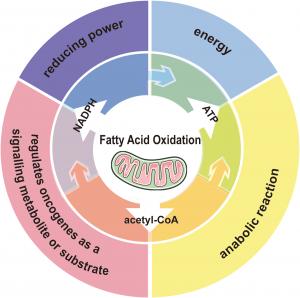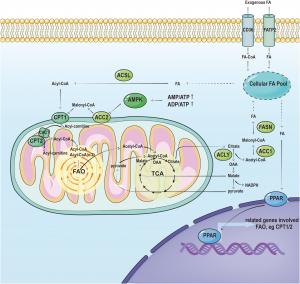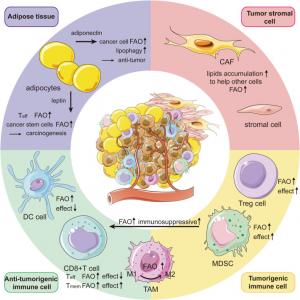Unveiling the Power of Fatty Acid Oxidation in Cancer Progression and Therapy
SHANNON, CLARE, IRELAND, April 28, 2025 /EINPresswire.com/ -- This new review article published in Genes & Diseases sheds light on the pivotal role of fatty acid oxidation (FAO) in the complex landscape of cancer metabolism. Traditionally overshadowed by the widely recognized Warburg effect, FAO is now emerging as a crucial metabolic pathway that fuels tumor development, influences drug resistance, and presents promising therapeutic targets.
This article highlights how certain cancer cells depend on FAO as a primary energy source, enabling their growth, survival, and metastasis. Unlike normal cells, many tumors exhibit a shift towards enhanced FAO, leveraging this process to sustain energy production, support epigenetic modifications, and maintain immune evasion. The authors emphasize how metabolic reprogramming through FAO provides cancer cells with a strategic advantage, allowing them to thrive even under conditions of nutrient scarcity.
One of the most striking revelations is FAO’s direct involvement in chemotherapy resistance. Tumors that activate FAO can counteract the oxidative stress induced by treatment, reducing apoptosis and making conventional therapies less effective. The upregulation of FAO has been particularly noted in breast cancer, glioblastoma, and ovarian cancer, where it contributes to aggressive tumor behavior and metastasis.
Beyond its role in fueling tumors, FAO also plays a key part in regulating the tumor microenvironment (TME). By influencing immune cell activity, FAO modulates the body's natural defense mechanisms against cancer. The review explores how targeting FAO can open new avenues for oncotherapy, offering a promising strategy to disrupt cancer cell metabolism while minimizing harm to healthy tissues.
Given its growing importance in cancer biology, FAO is gaining recognition as a therapeutic vulnerability. The review outlines potential FAO inhibitors, such as carnitine palmitoyltransferase (CPT1) blockers, which show promise in sensitizing tumors to chemotherapy and radiotherapy. By disrupting FAO-dependent survival mechanisms, these interventions could enhance the efficacy of existing treatments.
# # # # #
Genes & Diseases publishes rigorously peer-reviewed and high quality original articles and authoritative reviews that focus on the molecular bases of human diseases. Emphasis is placed on hypothesis-driven, mechanistic studies relevant to pathogenesis and/or experimental therapeutics of human diseases. The journal has worldwide authorship, and a broad scope in basic and translational biomedical research of molecular biology, molecular genetics, and cell biology, including but not limited to cell proliferation and apoptosis, signal transduction, stem cell biology, developmental biology, gene regulation and epigenetics, cancer biology, immunity and infection, neuroscience, disease-specific animal models, gene and cell-based therapies, and regenerative medicine.
Scopus CiteScore: 7.3
Impact Factor: 6.9
# # # # # #
More information: https://www.keaipublishing.com/en/journals/genes-and-diseases/
Editorial Board: https://www.keaipublishing.com/en/journals/genes-and-diseases/editorial-board/
All issues and articles in press are available online in ScienceDirect (https://www.sciencedirect.com/journal/genes-and-diseases ).
Submissions to Genes & Disease may be made using Editorial Manager (https://www.editorialmanager.com/gendis/default.aspx ).
Print ISSN: 2352-4820
eISSN: 2352-3042
CN: 50-1221/R
Contact Us: editor@genesndiseases.com
X (formerly Twitter): @GenesNDiseases (https://x.com/GenesNDiseases )
# # # # # #
Reference
Jialin Ma, Shuxian Wang, Pingfeng Zhang, Sihao Zheng, Xiangpan Li, Juanjuan Li, Huadong Pei, Emerging roles for fatty acid oxidation in cancer, Genes & Diseases, Volume 12, issue 4, 2025, 101491, https://doi.org/10.1016/j.gendis.2024.101491.
Genes & Diseases Editorial Office
Genes & Diseases
+86 23 6571 4691
editor|genesndiseases.com| |editor|genesndiseases.com
Legal Disclaimer:
EIN Presswire provides this news content "as is" without warranty of any kind. We do not accept any responsibility or liability for the accuracy, content, images, videos, licenses, completeness, legality, or reliability of the information contained in this article. If you have any complaints or copyright issues related to this article, kindly contact the author above.
Sphere Studio LLC Expands Globally with Strategic Web Solutions for the Hispanic Market
Seismic Data Processing & Imaging Software Market Generated Opportunities, Future Scope by 2032 | Halliburton, CGG, SLB
Electronic Scrap Recycling Market To Witness Substantial Growth, 2025-2032 | Umicore N.V., Dowa Holdings Co. Ltd.
Kalendarium
Więcej ważnych informacji
 Jedynka Newserii
Jedynka Newserii

 Jedynka Newserii
Jedynka Newserii

Infrastruktura

Blackout w Hiszpanii i Portugalii ujawnił braki europejskiego systemu elektroenergetycznego. Niezbędna modernizacja sieci i połączeń między krajami
Komisja Europejska musi wyciągnąć wnioski z problemów z dostawami energii w Hiszpanii i Portugalii. Zapowiada też podjęcie działań, aby uniknąć takich poważnych blackoutów w przyszłości. Eksperci apelują przede wszystkim o inwestycje w modernizację sieci, by była ona gotowa na większą liczbę źródeł odnawialnych, a także w rozbudowę połączeń między państwami członkowskimi, dzięki czemu łatwiej będzie reagować na kryzysy.
Problemy społeczne
37 proc. Ukraińców nie wie, jak zaszczepić dziecko w Polsce. Potrzebna większa edukacja w tym zakresie

Choć trzech na czterech uchodźców z Ukrainy darzy polski system ochrony zdrowia dużym zaufaniem, to 21 proc. z nich ma problem z zaufaniem do samych szczepień. To dlatego wiele ukraińskich mam podejmuje decyzję o nieszczepieniu dziecka. Dużym wyzwaniem jest więc zwiększanie ich świadomości na temat korzyści płynących ze szczepień dla zdrowia jednostek i całej populacji, a także wyjaśnianie wątpliwości związanych z ewentualnymi skutkami ubocznymi. Tę rolę edukacyjną musi wziąć na siebie polski personel systemu ochrony zdrowia.
Telekomunikacja
Dyrektywa unijna zmienia podejście do cyberbezpieczeństwa. W Polsce trwają prace nad jej wdrożeniem

Według zapewnień rządu w tym kwartale zakończą się rządowe prace nad nowelizacją ustawy o krajowym systemie cyberbezpieczeństwa, która wdroży do polskiego prawa zapisy dyrektywy NIS2. Będzie to mieć istotne znaczenie dla kształtowania polityk cyberbezpieczeństwa przez duże i średnie podmioty zaliczane do kategorii kluczowych i ważnych. Choć pojawiają się głosy krytyczne, sugerujące, że regulacje są zbyt daleko idące, to eksperci od cyberbezpieczeństwa są przekonani, że akurat w tym obszarze mogą one przynieść szereg korzyści, zwłaszcza we współczesnych warunkach geopolitycznych.
Partner serwisu
Szkolenia

Akademia Newserii
Akademia Newserii to projekt, w ramach którego najlepsi polscy dziennikarze biznesowi, giełdowi oraz lifestylowi, a także szkoleniowcy z wieloletnim doświadczeniem dzielą się swoją wiedzą nt. pracy z mediami.









.gif)

 |
| |
| |
|